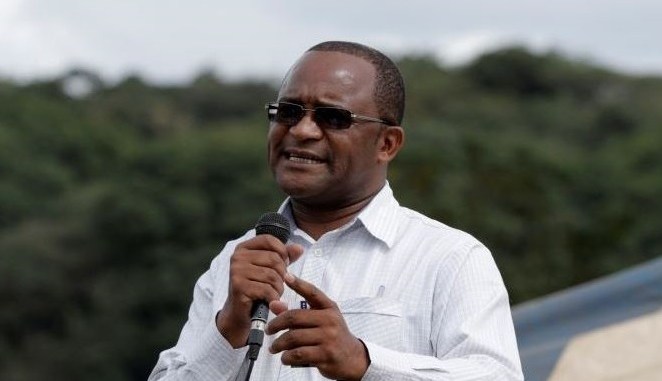PRESIDENT Emmerson Mnangagwa recently wrote to opposition leader Douglas Mwonzora of the MDC agreeing to dialogue with him to find solutions to the country’s political and economic crises.
Mwonzora had earlier met Mnangagwa seeking dialogue.
The Daily News on Sunday Chief Writer Blessings Mashaya last week had a chat with Mwonzora on the proposed national dialogue and other political and economic developments in the country.
Below are the excerpts.
Q: How important is national dialogue to Zimbabwe?
A: For the past three decades, political discourse in Zimbabwe has largely been a conversation of the deaf. As a result there was development of unparalleled polarisation within the Zimbabwe body politic.
Therefore, there is a need for a new political approach in the country. This politics will see the removal of the politics of hate, rancour, acrimony, polarisation, intolerance and violence and its replacement by politics of rational disputation and tolerance.
The unproductive bickering by Zimbabwe’s main political protagonists has seen the intervention of opportunistic forces both from the east and from the west in Zimbabwe’s politics.
It is, therefore, necessary that Zimbabweans find each other through dialogue. The hope of the MDC is that through dialogue we can achieve those things that are truly to the benefit of the Zimbabwean people .
Properly consummated dialogue will lead to key social, political and economic reforms.
That will mean that Zimbabweans may collectively find answers to such maladies like endemic poverty, deprivation, inequality, economic decline, the international isolation of the country and perennially contested elections and more social security and the restoration of lost pensions.
Dialogue may also result in key electoral reforms, including the introduction of the diaspora vote which is overdue.
Dialogue has worked before in Zimbabwe. For example the war of liberation, the Gukurahundi massacres and the senseless bloodletting in 2008 were all ended through dialogue.
Q: Do you want a government of national unity (GNU) or what sort of an arrangement do you want?
A: We do not know what the exact outcome of the dialogue will be. We want an outcome that will culminate in a better Zimbabwe free from poverty and misery. We want to see Zimbabwe embark on a developmental trajectory that leaves no one behind. In advocating for dialogue our preoccupation is not sharing political power.
It is rather to achieve something that will lead to a better social, political and economic life of the Zimbabwean person.
We will be guided by what Zimbabweans want. Whether they want a GNU or any other arrangement is up to the Zimbabwean people. We simply want to see Zimbabweans happy.
Q: When are you going to join Polad?
A: We are currently consulting our structures on the invitation to join Polad. After these consultations we will convene our national council before announcing the decision to the nation.
In all our dealings, we will be guided by what is in the best interests of the Zimbabwean people. Our view on dialogue is that it must be genuine, inclusive and unconditional.
Q: Do you think Polad is the best platform for dialogue and why do you want to join Polad?
A: We have already made it clear that we want inclusive dialogue. This is dialogue that should be organic and must include both political and non-political actors.
As things stand, Polad is exclusively for political actors. These don’t form the sum total of Zimbabwe’s body politic.
Our view is that if Polad is to be a viable platform it must structurally change to enable views from non-political actors like labour, business, churches, civil society organisations, youth and women’s groups to be harnessed. It must structurally reflect the political realities in our nation. We want dialogue. Polad is not a dialogue. It is a dialogue platform.
Q: If dialogue fails, do you think 2023 elections are going to be credible?
A: We don’t believe that elections without reforms are a viable proposition for Zimbabwe.
We are sure that getting into elections without reforms will simply bring us back to square one.
Unfortunately, there are some people within the opposition who believe that they can win elections without reforms.
In other words they believe that they can win unfree and unfair elections. We don’t share this foolish bravery at all.
We cannot postulate what the situation will be like in 2023. We are hoping for reforms before elections and we are working hard for these.
Q: On electoral reforms, do you think the ruling party is eager to implement reforms?
A: The ruling party’s preference on the type of elections Zimbabwe should have is irrelevant.
What is relevant is what the people of Zimbabwe want. We have seen in history situations where the ruling party’s interests were defeated by the interests of the Zimbabwean people.
I know that powerful people within Zanu PF did everything within their power to stop the constitution making process, but Zimbabweans prevailed.
As the MDC our belief is that with proper focus, strategy and planning, nothing is unwinnable, nothing is unachievable if we put our minds to it.
Q: Some critics say you are always in agreement with Zanu PF, what is your response to this allegation?
A: Most of my critics are not genuine critics. They are political opponents or people bidding for my political opponents.
They want to be stars in the absence of the sun and are, therefore, extremely frightened at the competition that we offer.
One of the oldest tricks in Zimbabwean politics is to brand your opponent as either a Zanu PF puppet or a Western puppet. That is the sad fact of our political life.
For example, when Welshman Ncube split from the MDC in 2005, he was branded a Zanu PF puppet. When Tendai Biti through naked ambition split the party in 2014 he was dubbed a Zanu PF puppet.
When Morgan Tsvangirai proved too hot to handle for Zanu PF, Jonathan Moyo and other Zanu PF propagandists of that time dubbed him a Western puppet.
The main strategy of the opposition at the formative stages of MDC was to disagree on everything with Zanu PF. It was to totally refuse to see any positivity at all.
The main strategy of Zanu PF was to totally thwart and annihilate the opposition. That method has its limitations.
It is high time that opposition parties must adapt and change tact.
I have disagreed with Zanu PF on more issues and instances than my critics.
I have disagreed with Zanu PF on corruption, discrimination of Zimbabweans on the basis of political opinion, unequal access to national resources, militarisation of State institutions, disenfranchisement of Zimbabweans in the diaspora and falsification of history, etc.
Q: Your assessment of president Mnangagwa’s rule since 2018?
A: Compared with the period under (the late former president Robert) Mugabe, we have seen less bloodshed.
The economy, though bad and fragile, is more stable than under Mugabe.
However, President Mnangagwa’s government has not done much to stamp out corruption and stop illicit financial flows.
For example, Zimbabwe is losing US$3 billion a year through corruption and other illicit financial flows.
We have seen financial exclusion in which over US$1 billion is kept outside the banking system in the country. Further, there have not been any meaningful electoral reforms to date.
Q: Some people say a divided opposition will not win the 2023 elections, do you agree with this?
A: It is not true that when a party gets divided then it’s all doom and gloom for it.
Zapu split and Zanu went on to win elections and form a government in 1980. In 2005, the MDC split and three years later the MDC went on to post its biggest electoral victory in history.
We are very happy that our message of dialogue and the cessation of internal hostilities has the approval of 76 percent of Zimbabweans in the rural areas and 68 percent of Zimbabweans in the urban areas. We will win the next elections.
Q: Are you going to approach Nelson Chamisa for unity ahead of 2023?
A: We have made overtures to Chamisa, but he is not interested. His officials have gone on a crusade against us on social media, hurling all sorts of insults, propaganda and outright lies.
However, they have failed to wish us away. We are a fact.
The problem is that they are controlled by Zanu PF (G40) which is outside government.
Q: When is your party congress?
A: We have started our congress preparations and the next national council will deliberate on this issue after which as president I will announce the congress dates.
The congress is going to be held soon.




